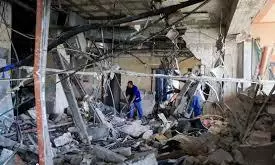
Shortage of essentials in Gaza fuels surge in preventable diseases: UN
text_fieldsUnited Nations: UN humanitarians report a sharp increase in preventable diseases in Gaza, driven by critical shortages of clean water, sanitation, and fuel. According to the UN Office for the Coordination of Humanitarian Affairs (OCHA), aid partners documented more than 19,000 cases of acute watery diarrhoea over the past two weeks, along with over 200 cases each of acute jaundice syndrome and bloody diarrhoea, Xinhua News Agency reported.
"These outbreaks are directly linked to the lack of clean water and sanitation in Gaza, underscoring the urgent need for fuel, medical supplies, and water, sanitation and hygiene items to prevent further collapse of the public health system," the humanitarians said.
Aid partners have reported another mass casualty event at Al Aqsa Hospital following an airstrike in Deir al-Balah. The hospital received over 20 fatalities and 70 injured individuals, with additional patients transferred to the Nasser Medical Complex and two other health facilities.
“Civilians in Gaza continue to be killed or injured daily—whether by Israeli airstrikes, shelling, or while searching for food for their families,” said the UN Office for the Coordination of Humanitarian Affairs (OCHA). “These tragic events must not be normalized and must come to an immediate end.”
In a rare moment of relief, the World Health Organisation (WHO) confirmed its first medical delivery into Gaza since March 2, when Israel enforced a full blockade. Nine trucks entered through the Kerem Shalom/Karem Abu Salem crossing, carrying essential medical supplies, including 2,000 units of blood and 1,500 units of plasma.
The supplies were dispatched to priority hospitals, with the blood and plasma stored at the Nasser Medical Complex in Khan Younis for wider distribution. The WHO emphasised that the delivery meets only a fraction of the mounting needs, calling it “a drop in the ocean” as facilities struggle to cope with a surge in casualties—many linked to violent incidents at non-UN, militarised food distribution sites operated by the US.
On Wednesday, Israeli authorities rejected six of 17 UN-coordinated humanitarian movements in Gaza, including efforts to truck in water and repair roads. Nine movements—such as solid waste removal and cargo retrieval—were permitted, while two others were not pursued.
“The continued restrictions on humanitarian access are severely undermining life-saving operations,” OCHA said.
The agency also voiced deep concern over rising violence and Israeli settler attacks in the West Bank. It documented a deadly raid on Kafr Malik, where hundreds of settlers—some armed and accompanied by Israeli forces—killed three Palestinians, injured several others, and set homes ablaze. The village, located in the Ramallah governorate, has a population of over 3,000, according to the Palestinian Central Bureau of Statistics.
That same day, roughly 20 settlers set fire to farmland in Asira al-Qibliya village in the Nablus governorate.
“Civilians continue to bear the brunt of this prolonged Israeli occupation,” the agency said, reiterating its call for civilian protection, humanitarian access, and full adherence to international law.
(inputs from IANS)


















